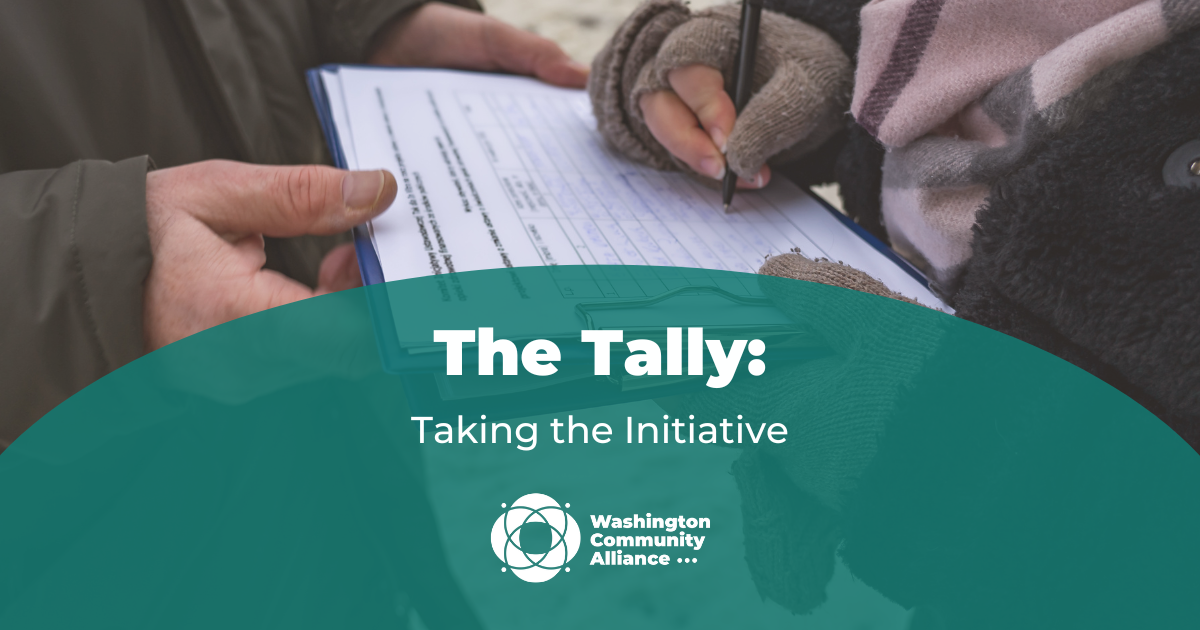
Howdy partner—
As we mosey on into interim in such a monumental election season we’ve decided to continue sharing updates from WCA through The Tally twice a month. We just can’t get enough of y’all and your can-do attitudes 💖
The Tally began as a way to bring grasstops leaders (read: you) closer to the sausage-making process that is crafting laws (read: #WALeg). Together, we’ve seen thousands of actions taken, hundreds of emails sent, a handful of good laws passed, and a roadkill caucus, well, killed.
Now, we’re bringing you election coverage in only the way we can, demystifying the electoral process and firing off the best jokes in state politics. You know the drill: when you see an email from us, we’ll be bringing stuff to do, resources, insights, and classic spicy takes that only The Tally serves.
First up, ballot initiatives. This week we’re peeling back the curtain on how initiatives work and their history in Washington state:
🗳️ Ballot Initiatives 101 🗳️
What are initiatives?
- Initiatives are petitions to place proposed legislation on the ballot for fellow voters to decide on—like a Change.org petition to turn your idea into the law of the land
- Once authorized by the Secretary of State, you can either put the proposition directly “to the People” via the ballot or “to the Legislature” via legislative session, bypassing voters’ say
- Most Americans don’t live in a state with a ballot initiative process
- With a constitution written and ratified at the height of the American populist movement, it is no surprise our state has an exceptionally strong tradition of ballot initiatives
- Our own national research showed 60% of ballot initiatives outperform Democratic candidates, and 100% of these initiatives were victorious
- Populism (if you remove the nationalism and racism) is good, actually
How do initiatives get on the ballot?
- Any registered voter of Washington State may propose legislation to create a new state law or to amend or repeal an existing state law
- Initiatives to the People
- Filing starts 10 months before the state general election with signatures due six months later
- Initiatives to the Legislature
- Filing starts 10 months before the start of the next state legislative session with signatures due 10 days before the legislature is gaveled in
- Initiatives to the People
- Once filed, the Attorney General writes your ballot title, which the SoS will use to print your petitions
- As of right now, you need to gather ~405,000 valid signatures (450K for good measure) to qualify (8% of the total voters in the last gubernatorial election)
- After you turn them in, the SoS inspects signatures for duplicates and validity
- For Initiatives to the Legislature, the Legislature must take one of the following three actions:
- The Legislature may adopt the Initiative as proposed and it becomes law without a vote of the people;
- The Legislature may reject or refuse to act on the proposed Initiative and the Initiative must be placed on the ballot at the next state general election; or
- The Legislature may propose an alternative measure dealing with the same subject and both measures must be placed on the next state general election ballot
Recent initiatives successes
Across the past four presidential election cycles (that’s 12 years, my fellow English majors) we have only seen five successful Initiatives to the Legislature. In all cases, the legislature passed the buck to the voters:
- Tim Eyman’s $30 Car Tabs
- In 2019 chronic anti-tax initiative promoter Tim Eyman put forth I-976, a measure that would have steeply discounted the price of car registrations at $30 while gutting transportation budgets across the state
- I-976 was an Initiative to the Legislature that was not acted on and placed on the ballot, passing with 53% of the vote but later overturned by the Washington State Supreme Court
- Policing & deadly force
- Passed in 2018, I-940 requires law enforcement to receive violence deescalation, mental-health, and first-aid training, and provide first-aid; and change standards for use of deadly force, adding a “good faith” standard and independent investigation
- Rights of corporations
- In response to Citizens United, Washington residents passed I-736 in 2016 which urged the Washington state congressional delegation to propose a federal constitutional amendment that constitutional rights belong only to individuals, not corporations, and constitutionally-protected free speech excludes the spending of money
- Firearm background checks
- Often discussed as “universal background checks”, I-594 passed in 2014, applying existing criminal and public safety background checks by licensed dealers to all firearm sales and transfers, including gun show and online sales, with specific exceptions
- Legal weed
- In 2012 Washington state passed I-502 legalizing and regulating the production, possession, delivery, and distribution of marijuana
Any voter can sponsor an initiative, try to get enough of their fellow voters to co-sponsor by signing them, and turn their idea into law if a majority of fellow voters vote to pass it (and courts find that the idea is actually legal). It means initiatives are a great tool for every day people to have a say in the laws that shape their lives and futures. But initiatives have been used for both progress and regression in our states’ history, and likely into our future.
Keep your eyes peeled for the next edition of The Tally where we’ll dive into the Let’s Go [Backward] Washington initiatives, legislator responses, and what it means for working people across the state. 👀
What do you think? Have any questions? Tweet us your thoughts @WACommAlliance.
Keep up on the action and opportunities to get involved through our legislative newsletter, The Tally.




